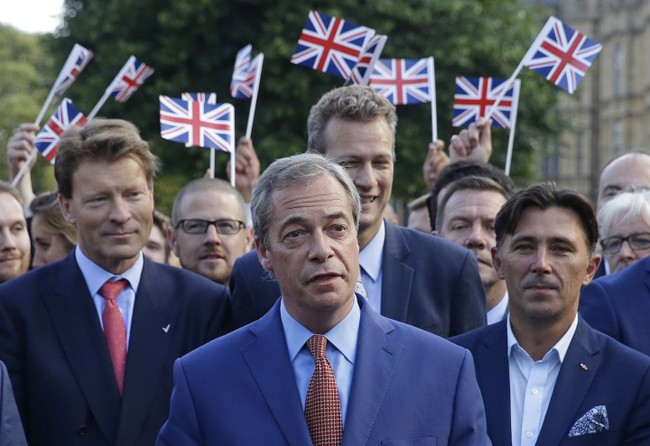We support our Publishers and Content Creators. You can view this story on their website by CLICKING HERE.

BOOM!
Last week I wrote about the shock poll that showed Reform UK pulling ahead of the Conservatives in the UK.
People have been predicting a Labour blowout for months, even before elections were called (in the parliamentary system the elections are called by a dissolution of the government, at the discretion of the ruling party/coalition, with a maximum but not minimum time in office).
Advertisement
The Tories have sucked as a ruling party, and have no right to call themselves “conservative.” They have been the Establishment for too long, have drifted away from their constituency, and deserve the drubbing at the polls they will surely receive.
Unfortunately, that means Labour will take power, and Labour is worse.
Do read the Substack. I’ve been as open & transparent as poss. We were widely criticised by established pollsters months ago for showing a Tory collapse. We were ahead of the curve. Now we are showing a big Reform surge. Who knows, maybe we’re ahead of the curve now…
— Matt Goodwin (@GoodwinMJ) June 19, 2024
The predicted collapse of the Tories is here, but the rise of Reform was not anticipated. At least not to this extent. And, to be honest, I am thrilled to see it.
Sure, people expected that once Nigel Farage decided to reverse his decision not to stand for Parliament he would give life to the Reform Party, but his entry has explosively changed the race. He is taking votes not only from the Tories as the true(r) conservative alternative, but has also started pulling votes from Labour.
Sometimes, things happen that completely knock you sideways. And today is one such moment. My firm People Polling, on behalf of its client GB News, surveyed a nationally representative sample of 1,228 British adults. We asked them how they plan to vote at the UK general election on July 4.
Here are our numbers:
Labour 35%
Reform 24%
Conservatives 15%
Liberal Democrats 12%
Greens 8%
SNP 3%
That’s right. Nigel Farage and Reform are on 24%, in second place, and some 9-points clear of Rishi Sunak and the Tories.
Were the above numbers to appear at the general election, in only fifteen days time, then the result would be, well, seismic in more ways than one.
Keir Starmer and the Labour Party would win the election comfortably, with a Labour majority of around 240 seats.
The Tories would crash and burn, falling to only around 45 seats. The Lib Dems would finish with more seats than the Tories, on around 64. Nigel Farage and Reform would not be far behind, on around 50. And the Greens would win two.
Advertisement
Remember, seats aren’t allocated by the national popular vote; as in the US the elections are won seat-by-seat, explaining why the numbers look skewed a bit.
The GB News poll is something of an outlier, but I am inclined to believe Reform is on a significant upswing for a variety of reasons, not the least of which is the salience of immigration as an issue. Britons are sick and tired of seeing their country overrun by “migrants” and the apparent indifference to this exhibited by the two biggest parties.
Furthermore, this evening several MRP polls are likewise pointing to a large Labour majority and putting the Tories on only around 50-108 seats.
One, by YouGov, puts Reform on 15% of the vote and gives Farage & Co. five seats.
The other, by Savanta, puts Reform on 13% of the vote and gives the party zero seats.
Inevitably, there will be questions about our poll because, firstly, it was conducted on behalf of our client, GB News, which has a close relationship with Nigel Farage —though the idea that the people who pay for polls influence the results of those polls is one for the tin foil hat brigade.
And, secondly, to be blunt, this strong vote for Reform is also being reported by somebody who’s talked a great deal about the incoming ‘inflection point’ and the likelihood of Reform performing very strongly at this election (that’s me!)
Advertisement
Farage was just interviewed by the Triggernometry guys, and they discussed this issue and its salience to Britons. Immigration has been a taboo subject in the mainstream, but the fact is that ordinary people’s lives have been upended, and few people are thrilled to see the streets of London turned into little Tehran or Gaza City.
Farage is hardly Donald Trump–Britain and the U.S. have very different political cultures–but he shares the Trumpian charisma and ability to break through to ordinary people. He is smart, entertaining, upbeat, and speaks clearly to the concerns that people have.
He doesn’t come across as a member of the Elite, although in most ways he is definitely qualified. He simply refuses to join their club.
Farage was the leader of the Brexit movement; he rejected the internationalization of Great Britain, and he scoffs at the obsessions of the Elites who care more about what the Davos crowd think than people who are trying to live their lives without losing their freedom, their prosperity, and their culture.
Farage isn’t going to be Prime Minister anytime soon, but he is, in many ways, the most influential British politician since Thatcher.
I’m good with that.

 Conservative
Conservative  Search
Search Trending
Trending Current News
Current News 







